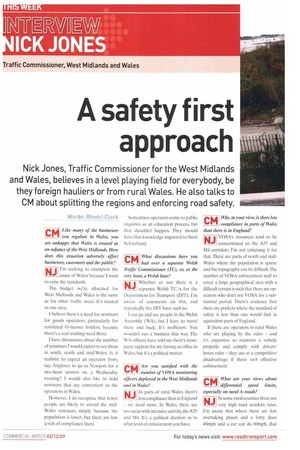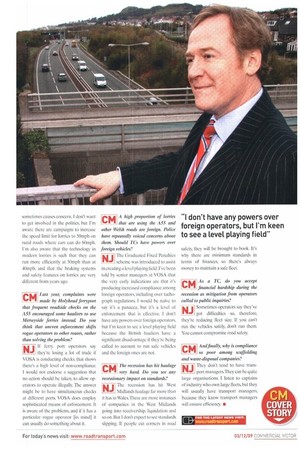A safety first approach
Page 20

Page 21

If you've noticed an error in this article please click here to report it so we can fix it.
Nick Jones, Traffic Commissioner for the West Midlands and Wales, believes in a level playing field for everybody, be they foreign hauliers or from rural Wales. He also talks to CM about splitting the regions and enforcing road safety. 011111111111111M
Words: fthodri Mark
cmLike many of the businesses you regulate in Wales, you are unhappy that Wales is treated as an adjunct of the West Midlands. How does this situation adversely affect businesses, customers and the public? I'm seeking to champion the cause of Wales because I want to raise the standards.
The budget we're allocated for West Midlands and Wales is the same as for other traffic areas. It's treated as one area.
I believe there's a need for seminars for goods operators, particularly for restricted 0-licence holders, because there's a real training need there.
I have discussions about the number of seminars: I would expect to see them in south, north and mid-Wales. Is it realistic to expect an operator from. say. Anglesey to go to Newport for a two-hour session on a Wednesday evening? I would also like to hold seminars that are convenient to the operators in Wales.
However, I do recognise that fewer people are likely to attend the midWales seminars, simply because the population is lower, but there are low levels of compliance there. Sometimes operators come to public inquiries as an education process, but that shouldn't happen. They should have that knowledge imparted to them beforehand.
What discussions. have you had over a separate Welsh Traffic Commissioner (TC), or at the very least, a Welsh base?
NJWhether or not there is a separate Welsh TC is for the Department for Transport (DfT). I'm aware of comments on this, and repeatedly the DfT have said no.
I can go and see people in the Welsh Assembly (WA), but I have to travel there and back. It's inefficient. You wouldn't run a business that way. The WA officers have told me there's crossparty support for my having an office in Wales, but it's a political matter.
CM, CM Are you satisfied with the number of Va5A monitoring officers deployed in the West Midlands and in Wales.?
In parts of rural Wales, there's less compliance than in England — we need more. In Wales, there are two areas with intensive activity, the A55 and M4. It's a political decision as to what level of enforcement you have.
NJ
CM Why, in your view, is there less compliance in parts of Wales than there is in England?
VOSA's resources tend to be concentrated on the A55 and M4 corridors I'm not criticising it for that. There are parts of north and midWales where the population is sparse and the topography can be difficult, The number of VOSA enforcement staff to cover a large geographical area with a difficult terrain is such that there are operators who don't see VOSA for a substantial period. There's evidence that there are pockets where the standard of safety is less than one would find in equivalent parts of England.
If there are operators in rural Wales who are playing by the rules — and it's expensive to maintain a vehicle properly and comply with drivers' hours rules — they are at a competitive disadvantage if there isn't effective enforcement.
NJ
CM What are your views about differential speed limits, especially on rural A-roaLly? N, In some rural counties there are 40 very high road accident rates. I'm aware that where there are few overtaking places and a lorry does 40mph and a car can do 60rriph, that
sometimes causes cc.)ncent. I don't want to get involved in the politics, hut I'm aware there are campaigns to increase the speed limit for lorries to 50mph on rural roads where cars can do 60mph. I'm also aware that the technology in modern lorries is such that they can run more efficiently at 50mph than at 40mph, and that the braking systems and safety features on lorries are very different from years ago.
CM Last year, complaints were made by Holyhead ferryport that frequent roadside checks on the A55 encouraged some hauliers to use Merseyside ferries instead Do you think that uneven enforcement shifts rogue operators to other routes, rather than solving the problem?
If ferry port operators say they're losing a lot of trade if VOSA is conducting checks, that shows there's a high level of non-compliance. I would not endorse a suggestion that no action should be taken, to allow operators to operate illegally. The answer might be to have simultaneous checks at different ports. VOSA does employ sophisticated means of enforcement. It is aware of the problems, and if it has a particular rogue operator [in mind.] it can usually do something about it.
NJ
CM A high proportion of lorries that are using the A55 and other Welsh roads are foreign. Police have repeatedly voiced concerns about them. Should it's have powers over foreign vehicles?
The Graduated Fixed Penalties scheme was introduced to assist in creating a level playing field. I've been told by senior managers at VOSA that the very early indications are that it's producing increased compliance among foreign operators, including over tachograph regulations. I would be naïve to say it's a panacea, but it's a level of enforcement that is effective. I don't have any powers over foreign operators, but I'm keen to see a level playing field because the British hauliers have a significant disadvantage if they're being called to account to run safe vehicles and the foreign ones are not.
NJ
4.14 The recession has hit haulage very hard Do you see any recessionary impact on standards? NJ The recession has hit West Midlands haulage far more than it has in Wales. The re are more instances of companies in the West Midlands going into receivership, liquidation and so on. But I don't expect to see standards slipping. If people cut corners in road
safety, they will he brought to book. It's why there are minimum standards in terms of finances, so there's always money to maintain a safe fleet.
CM As a TC, do you accept financial hardship during the recession as mitigation front operators called to public inquiries?
Sometimes operators say they've got difficulties so, therefore, they're reducing fleet size. If you can't run the vehicles safely, don't run them. You cannot compromise road safety.
NJ
And finally, why is compliance so poor among scaffolding and waste-disposal companies?
NJ They don't tend to have transport managers.They can be quite large organisations. I listen to captains of industry who own large fleets, but they will usually have transport managers, because they know transport managers will ensure efficiency. • CM














































































































































